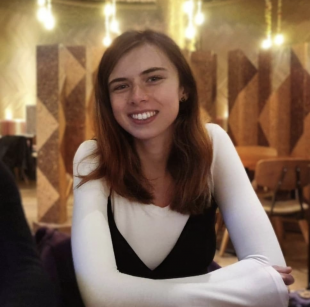| Name | Fiona King |
| Degree Title | MEng (Hons) Electronics and Electrical Engineering |
| Year of Graduation | 2019 |
What path has your career taken since graduation?
During my final year of university I took a course called Embedded Mobile and Wireless Systems, where we used Android Studio to build various Android mobile apps. This class was a real lightbulb moment for me - I had enjoyed university up to this point but now I was finding I'd entered a state of flow, able to spend hours coding but feeling as though no time had passed at all. I knew at this point that I wanted to pursue a career in software rather than electronics.
I used the university's MyCareerHub site to find a job opening for a Graduate Software Engineer at a company called Metaswitch Networks. No prior experience was required which was great for me - any coding I had learned at university was a bonus. After only working for 9 months it was announced that the company was being bought over by Microsoft, and I have been working for Microsoft ever since.
What is your current role?
I'm a software engineer, operating as part of a team that develops and maintains sites and tools that are used internally within the company. This means that our 'customers' are all engineers who we work with day to day.
Our team own the entire development lifecycle of our products, so my work involves core software engineering tasks as well as elements of product management. I work directly with users to understand their requirements, before moving onto the design, implementation and testing.
What I find most rewarding is having the opportunity to hear directly from our users about the impact our team's work has. It's amazing when you see how a change you've made makes even just one person's day so much easier! I also love the opportunity to work across a breadth of technologies across the stack (backend and frontend). This role has felt like the ideal place to pick up a lot of core software engineering skills, where with such an accessible user base we can move fast from concept to deploying code into production.
What experiences do you feel helped you get to your current position?
As part of my degree I conducted a summer internship and then my MEng placement with Cirrus Logic. This offered a bridge between academia and industry, providing me with experience working in an office environment. One of the most valuable parts of this process for me was actually doing the round of interviews with various electronics companies to get the MEng placement in the first place. This was my first introduction into taking technical interviews, and I believe practising this relatively early on helped me to then get my graduate role after university.
How have you used the skills and/or knowledge developed during your degree in your career?
In the second year of my degree I had the opportunity to take a year-long module in C. I believe having this background meant I was able to pick up other programming languages more easily later. It also introduced my early on to concepts such as pointers, multithreading and memory allocation, which are important to understand as a software engineer.
Though my focus has shifted from electronics to software, the analytical and systematic approach to problem-solving cultivated during my electronics degree translates across into my current role. Whether it was writing Verilog, designing an electronics circuit, or even trying to understand a new concept from a lecture, university forced me to learn how to break down complex problems into smaller, more manageable tasks, which is a key skill whatever your career!
What advice would you give to students who are interested in your area of work?
When choosing what to do after university, spend some time thinking about what route you would actually like to go down, rather than just taking what you think is the most obvious next step. If that career is in the same area as the degree you studied, that's great! But don't feel as though the degree you studied needs to determines what career you'll have for the rest of your life.
I know personally I was initially a little hesitant to make the switch from electronics to software - I'd just spent 5 years at university gaining all this electronics knowledge! But technology and the software industry are always changing (for example, the recent explosion of AI). As a software engineer you are continuously learning new things, which is one of the aspects I love most about it. Whilst having a solid base understand of the fundamentals is important, so is your curiosity, adaptability and keenness to learn - qualities which I definitely took away from my time at university.
This profile was published in March 2024



